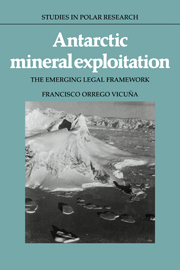Book contents
- Frontmatter
- Contents
- Preface
- Acknowledgement
- Abbreviations
- Part I The international legal framework of Antarctic co-operation and the development of resources
- 1 The evolution of the system of Antarctic co-operation and the influence of the development of resources
- 2 The Antarctic legal system and the development of a norm-creating function in the field of natural resources
- 3 Antarctic sovereignty and jurisdiction: new approaches for a resources policy
- 4 The Law of the Sea in the Antarctic Treaty system: its evolution in the light of the resources regime
- Part II Alternative approaches to the conservation and development of Antarctic minerals: the process of internal accommodation
- Part III Issues and options relating to the external accommodation
- Appendix 1 The Antarctic Treaty
- Appendix 2 Table of signatures and ratifications
- Table of Cases
- Table of Statutes and national legislation
- Table of Treaties
- Bibliography
- Index
3 - Antarctic sovereignty and jurisdiction: new approaches for a resources policy
Published online by Cambridge University Press: 04 November 2009
- Frontmatter
- Contents
- Preface
- Acknowledgement
- Abbreviations
- Part I The international legal framework of Antarctic co-operation and the development of resources
- 1 The evolution of the system of Antarctic co-operation and the influence of the development of resources
- 2 The Antarctic legal system and the development of a norm-creating function in the field of natural resources
- 3 Antarctic sovereignty and jurisdiction: new approaches for a resources policy
- 4 The Law of the Sea in the Antarctic Treaty system: its evolution in the light of the resources regime
- Part II Alternative approaches to the conservation and development of Antarctic minerals: the process of internal accommodation
- Part III Issues and options relating to the external accommodation
- Appendix 1 The Antarctic Treaty
- Appendix 2 Table of signatures and ratifications
- Table of Cases
- Table of Statutes and national legislation
- Table of Treaties
- Bibliography
- Index
Summary
Antarctic sovereignty and co-operation: the need for reconsideration
The discussion on sovereignty in the Antarctic continent has traditionally been dominated by the question of territorial claims and the procedures for making such claims, and by the way in which the requirements of effective occupation are fulfilled. This is adequate for the needs of a period in which territorial rivalries and the other positions that have been considered competed for control of the system of organization that was applied to the Antarctic continent.
However, the development that has taken place over the last twenty-five years has highlighted two cardinal elements. The first is that, in spite of the many existing difficulties, sovereignty has become an established fact in the Antarctic. But this is so only in a relative sense, since simultaneously there has also been the development of the second basic element, consisting in a powerful framework of international co-operation in Antarctica. The fundamental link between these two elements has been Article IV of the Antarctic Treaty, which by freezing formal claims to sovereignty and not prejudging on the issue has made possible the strengthening of the process of co-operation in the region. As was pointed out earlier, sovereignty has become inseparable from co-operation in the Antarctic since it would be difficult to maintain sovereignty unless it were closely linked with the factor of co-operation.
- Type
- Chapter
- Information
- Antarctic Mineral ExploitationThe Emerging Legal Framework, pp. 76 - 126Publisher: Cambridge University PressPrint publication year: 1988

